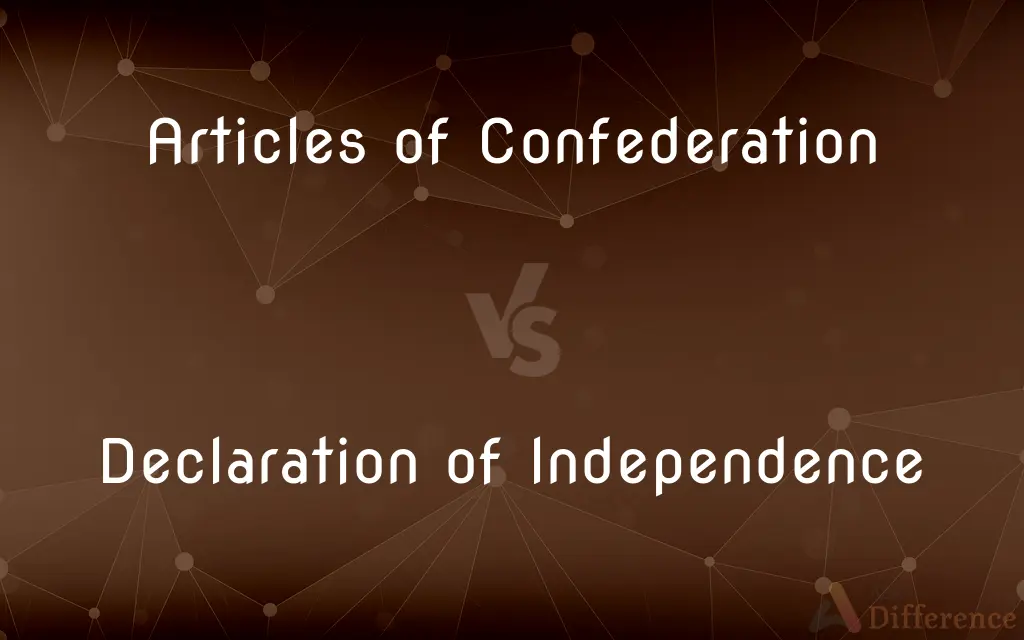Articles of Confederation vs. Declaration of Independence — What's the Difference?
By Tayyaba Rehman — Published on January 23, 2024
The Articles of Confederation was the first constitution of the United States, whereas the Declaration of Independence was a document declaring independence from Britain.

Difference Between Articles of Confederation and Declaration of Independence
Table of Contents
ADVERTISEMENT
Key Differences
Articles of Confederation, adopted in 1781, served as the first constitution of the United States, establishing a confederal government. Declaration of Independence, adopted on July 4, 1776, was a formal statement declaring the Thirteen Colonies independent from British rule.
The Articles of Confederation provided a framework for national government, but it gave limited powers to the central government, with most powers retained by the states. The Declaration of Independence, authored primarily by Thomas Jefferson, outlined the colonies' grievances against the British monarchy and justified their right to revolt.
Under the Articles of Confederation, there was no strong central government, no executive branch, and no judiciary, with a unicameral legislature. The Declaration of Independence did not establish a government but instead articulated the principles of individual liberty and the government's role in securing these rights.
The Articles of Confederation were eventually deemed ineffective, leading to the Constitutional Convention and the creation of the U.S. Constitution. The Declaration of Independence remains a symbol of American freedom and the foundational statement of American democracy.
The Articles of Confederation represent an early attempt at self-governance by the newly independent states, while the Declaration of Independence is a philosophical and moral proclamation, setting the stage for the development of U.S. democracy.
ADVERTISEMENT
Comparison Chart
Nature
First U.S. constitution
Formal statement of independence
Purpose
Establish national government structure
Declare independence from Britain
Governmental Framework
Weak central government
Did not establish a government
Historical Context
Post-independence governance
Justification for revolution
Legacy
Replaced by the U.S. Constitution
Enduring symbol of American principles
Compare with Definitions
Articles of Confederation
Early U.S. governing document.
The Articles of Confederation established the first national government.
Declaration of Independence
Authored by Thomas Jefferson.
Thomas Jefferson was the principal author of the Declaration of Independence.
Articles of Confederation
Lacked a strong central authority.
The Articles of Confederation did not create a president or national court.
Declaration of Independence
Adopted July 4, 1776.
July 4 is celebrated due to the adoption of the Declaration of Independence.
Articles of Confederation
Emphasized state sovereignty.
Under the Articles of Confederation, states retained most of their power.
Declaration of Independence
Symbol of American democracy.
The Declaration of Independence embodies the ideals of liberty and justice.
Articles of Confederation
Replaced by the Constitution.
The weaknesses of the Articles of Confederation led to the Constitutional Convention.
Declaration of Independence
Outlined rights and grievances.
The Declaration of Independence lists grievances against the British crown.
Articles of Confederation
First constitution after independence.
The Articles of Confederation were adopted before the U.S. Constitution.
Declaration of Independence
Proclaimed colonial freedom.
The Declaration of Independence severed ties with Britain.
Common Curiosities
When were the Articles of Confederation adopted?
The Articles of Confederation were adopted in 1781.
Why were the Articles of Confederation replaced?
They were replaced due to their weaknesses, like the lack of a strong central government.
Was the Declaration of Independence a legal document?
It was more a philosophical and moral statement than a legal document.
What grievances are listed in the Declaration of Independence?
It lists grievances against British tyranny and the denial of the colonies' rights.
What is the Declaration of Independence?
The Declaration of Independence is a historic document declaring the American colonies' independence from British rule.
Who wrote the Declaration of Independence?
Thomas Jefferson was the primary author of the Declaration of Independence.
What does the Declaration of Independence represent?
It represents the American colonies' desire for freedom and their philosophical stance on government and individual rights.
What were the Articles of Confederation?
The Articles of Confederation were the first constitution of the United States, establishing a national government.
How did the Articles of Confederation impact the U.S. Constitution?
The weaknesses of the Articles influenced the framing of the stronger federal government in the Constitution.
What principles does the Declaration of Independence emphasize?
It emphasizes the principles of liberty, individual rights, and the idea that government should serve the people.
Did the Articles of Confederation create a president?
No, there was no executive branch or president under the Articles of Confederation.
Did the Articles of Confederation have a judiciary?
No, there was no national judiciary under the Articles.
How did the Articles of Confederation affect states?
States retained most of their power and sovereignty under the Articles.
Is the Declaration of Independence still relevant?
Yes, it remains a foundational symbol of American values and democracy.
Why is July 4th significant?
It marks the adoption of the Declaration of Independence in 1776.
Share Your Discovery

Previous Comparison
AC Bridge vs. DC Bridge
Next Comparison
Bullying vs. RaggingAuthor Spotlight
Written by
Tayyaba RehmanTayyaba Rehman is a distinguished writer, currently serving as a primary contributor to askdifference.com. As a researcher in semantics and etymology, Tayyaba's passion for the complexity of languages and their distinctions has found a perfect home on the platform. Tayyaba delves into the intricacies of language, distinguishing between commonly confused words and phrases, thereby providing clarity for readers worldwide.
















































